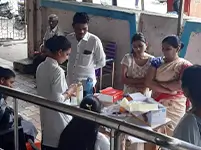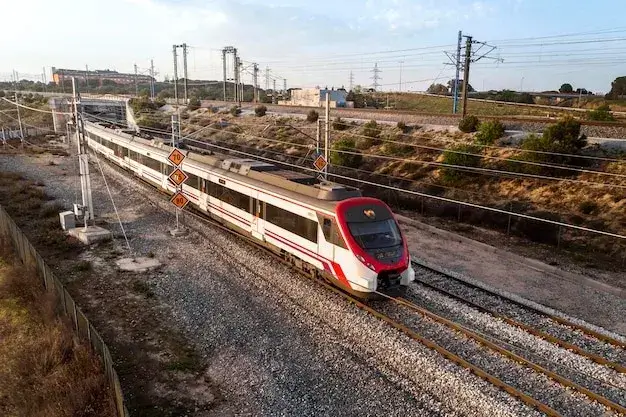
Urban poverty is a set of social and economic issues in industrialised cities that arise due to living standards, social fragmentation, labour dualization, and a rise in individualism. According to the 2011 census, about 78 million villagers transited from rural to urban. Urban Poverty in India is over 25 per cent; close to 81 million people in urban areas live below the poverty line. In India, the rural poor outnumber the urban poor. According to a survey by the UN State of the World Population report in 2007, by 2030, 40.76% of the country's population is expected to reside in urban areas.
Research interests of SCUS:

Urban areas have emerged as education epicenters in the past few decades. The recent National Education Policy, 2020 has introduced significant reforms in the education policy pan-India. The Government's expenditure in the state and urban areas is proving to be a massive booster in increasing the level of education in Urban India. 31% and 35% of the primary upper primary students received free education in the urban areas in 2017-18, respectively. At the same time, 25% of secondary and 14% of the higher secondary students received free education from the urban administration. The level of education and the subsidies are inversely related to each other.
With the rise in Urbanization, there is a significant challenge to provide excellent and affordable healthcare services in urban areas. The Out-of-Pocket Expenditure on health increased in 2016-17, along with the percentage of people in the metropolitan regions opting for health insurance (Journal of family medicine and primary care, 2019).
Sustainable Development Goals target provisioning of better physical and social infrastructure both in rural and urban areas. Localising SDGs would be the best way to achieve this. Bottom up approach via policy interventions and planning are the need of the hour to make these SDGs achievable.
Research interests of SCUS:

Housing is identified as the basic need under article 21 of our constitution, besides food and clothing by the Supreme Court. The government has backed the 'Housing for all scheme, which is targeted toward EWS (Economically weaker sections) with an annual income of less than Rs. Three lakhs and LIG (Lower Income Group) with a yearly income between 3-6 lakhs. Affordability means an individual/household's capacity to pay to purchase a house.
Affordable housing refers to any accommodation that fulfills some form of affordability criterion, which are income level of the family, size of the dwelling unit, or affordability in terms of EMI size or ratio of house price to annual income. There are 20 million households under this class. Inaccessibility to safe and clean drinking water, illiteracy, poor sanitation and hygiene, inequality in income, and not having a proper house are the results of the acute poverty in our country. Provisions of free accommodation or EMI-related programs must be made available by the government to help the poor. If the government does not look at this, the subsidies provided by the PMAY-U will only benefit the EWS, and the households below the poverty line will remain homeless. The government must sensitise banks to offer credit to these households.
Research interests of SCUS:

Urban finance looks at how the city authorities allocate their finances for the development of physical infrastructure like - roads, highways, water supply, construction of public gardens, etc., and social infrastructure like – education, sanitation, and health services. In the early 1990s, the Indian government implemented the 74th Constitutional Amendment Act (CAA), which instructed states to decentralize their governance through Urban Local Bodies (ULBs). However, decentralization has remained restricted concerning revenue resources and has also shown unequal growth between states. Cities in India are governed by the 74th CAA of 1992, which entrusts them with 18 essential functions: water supply, sanitation, local transportation, primary education, open spaces, parks and gardens, crematory centers, etc. The revenue available with the Urban Local Bodies (ULBs) are, however, limited (to property tax, building permission, water tax, and FSI-related taxes), which results in a complete miss-match between functions and finances at the local (municipal corporation) level.
Research interests of SCUS:

More than half of the world's population now live in urban areas. Rapid urbanisation in developing countries and urban redevelopment in developed countries are creating demand for renewed infrastructure in the coming decades. Cities (i.e., urbanisation) worldwide are facing enormous challenges in providing infrastructure services in a carbon-neutral and sustainable manner that offer resources and services, such as water, energy, shelter (buildings), mobility-connectivity, food, and sanitation, waste management, and green and public spaces. How cities grow in developing countries of the 21st century creates problems for humanity and ecology. Because of increasing economic development and modernization, rising energy demand and the natural environment are associated with the growth of industrialization and urbanization in developing countries.
Research interests of SCUS:

Urban mobility may be defined as the movement of city inhabitants and conditions associated with such trips like modes of transport selected, length of trip, time spent in the vehicle, etc. Traffic congestion and increased demand for public transport indicate the rising population. Hence, we need an effective means of transport beyond the traditional model. As a result, the Sustainability Urban Mobility Plan was developed. It is a strategic plan which ensures efficient mobility between cities for a better quality of life and focuses on micro-transit and Demands Responsive Transport. The main aim is to reduce the number of vehicles on the road as it is a shared transit model. India's mobility landscape faces several challenges, and last-mile connectivity is one of them. The government looks forward to resolving this issue using a multi-modal transport system. With capital-intensive projects like Metrorail coming under the scanner over financial viability in smaller cities, the government approved the Policy to introduce Metro lite in Tier-II and Tier-III cities.
Research interests of SCUS:

Urban disaster management involves Disaster Risk Reduction (DRR) and Climate Change Adaptation (CCA). It aims at mitigating the loss of life and property with the help of planning and preparing the urban areas for any disaster. It also involves the planning for the urban areas to shift from non-renewable to renewable energy. The use of more sustainable modes of transport, water conservation, reuse and recycling, and control of outdoor and indoor pollution is needed. The role of urban managers in this task becomes instrumental in this case. It also involves the kind of housing the urban areas must have to adapt to the existing climate and avoid further damage- basically thinking from a more sustainable perspective and preventing any loss of life and property. A separate plan for the cities is created under the City Disaster Management Programme (CDMP), which also involves the nine-stage strategies in a disaster project. The department encourages the adoption of modern technology with the adoption of the GIS, remote sensing, aerial photography, GPS, etc.
Research interests of SCUS:

The rapid pace of urbanization and resource-intensive development pathways put tremendous pressure on the urban environment and ecosystem services. Cities across the globe are facing problems with air quality deterioration on account of transport and industrial/commercial emissions, water and soil contamination due to inadequate sanitation and solid waste management and biodiversity loss with infrastructure development. With rapid conversion or merger of rural and peri-urban areas into bigger cities and metropolises, environmental challenges are likely to exacerbate. Added to these are the challenges posed by climate change and the limited adaptive capacity of cities to cope with it. Hence, the urban environment is an important thematic area for future research and policy interventions.
Research interests of SCUS:

The concept of Gender Mainstreaming is a globally accepted strategy to ensure gender equality in urban areas. The provision of infrastructure for women is highly undeserving, from the buses and street lights to the toilet seats. 74th Constitutional Amendment Act did create the 3rd tier government. However, we are still far away from gender-neutral urban infrastructure as women's participation in the legislative process is abysmally low. Women slum-dwellers suffer the most in this process with very negligible or zero access to essential services like water supply, sanitation, food, financial services, and safe neighbourhoods (UNDP Report on addressing gender concerns.)
Research interests of SCUS: